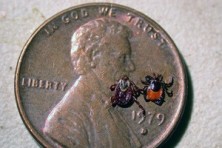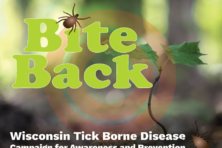State News: Illegal Voting, Abortion Research, Lyme Disease
- Share
- Tweet
- Pin
- Share
Teens Voted Illegally In Presidential Primary
Dozens of 17-year-olds voted illegally in last April’s presidential primary in Wisconsin, according to a report from the state Elections Commission.
In a draft report to the state Legislature, the commission shared information from local elections officials showing about 70 teenagers voted illegally in the primary. It’s not legal to vote in Wisconsin unless you’re 18 years old on or before Election Day.
The commission believes “a number of factors” led to the incidents, the report states.
“Our information is that, in a lot of these cases, the students believed that the law in Wisconsin allowed them to vote,” said Reid Magney, spokesman for the state Elections Commission.
It is legal in some states to vote in primary elections at age 17 if you are 18 years old by the general election. Magney said national messaging about that from presidential campaigns or media may have confused some teens.
He said the body overseeing state elections, then called the Government Accountability Board, didn’t see similar instances of teenage voter fraud in the 2008 or 2012 presidential elections.
The cases have been referred from local elections officials to district attorneys.
Kind Decides Against Governor Run
Wisconsin Congressman Ron Kind said he will not run as a Democratic candidate for governor in 2018.
Kind has represented Wisconsin’s 3rd Congressional District since 1997. His name has often been floated by Democrats as a possible gubernatorial candidate, but Kind has yet to run for the office.
Kind said he is “extremely humbled and appreciative” of the recognition, but has decided to focus on continued work in Congress.
Bill Banning Aborted Fetal Tissue Research Resurfaces
A proposal to ban research using aborted fetal tissue in Wisconsin is being reintroduced at the state Capitol.
Under the bill, researchers would be prohibited from using fetal tissue gathered during abortions.
Sen. Terry Moulton, R-Chippewa Falls, is one of the bill’s sponsors.
“I’m not opposed to fetal tissue research, but it’s not moral and ethical, I don’t think, to do it on tissue that’s the result of an induced abortion,” Moulton said. “The baby is not a blob, it’s not a mass of tissue…these are deceptive terms to disguise the truth. This is a real human child.”
Opponents to the bill say it would make it harder to conduct research on things like cancer, infectious diseases and developmental disorders.
A companion bill would require health care facilities to inform parents of stillborn or miscarried children about organ and tissue donation.
Wisconsin May Dodge Lyme Disease Uptick
Wisconsin may not see the same spike in Lyme disease that’s expected this year in northeastern states.
Scientists in New York are projecting a big spike in Lyme disease cases in the eastern United States.
Their projection is based on a sharp increase there in the number of mice, which are often covered in Lyme disease-carrying ticks.
Susan Paskewitz, professor of entomology at the University of Wisconsin-Madison, began checking Wisconsin sites in response to the news, to see if this state’s mouse population was also growing.
“What we found was no suggestion than in the three places where we looked, that we had seen any kind of a large spike last year that would indicate problems this year,” she said.
But she said even a typical year of Lyme disease cases in Wisconsin is a concern, because the disease that was once largely concentrated in northwestern Wisconsin has spread.
“(Ticks) have really moved into almost every piece of woods that we go and visit,” Paskewitz said. “We find them in Door County now, we find them down in Kenosha County, wherever there are woods.”
The Department of Health Services confirmed 1,300 cases of Lyme disease in 2015, with many more suspected cases.
The number of Lyme disease cases has trended upward as the state’s climate has become warmer and wetter.
Wisconsin Public Radio, © Copyright 2017, Board of Regents of the University of Wisconsin System and Wisconsin Educational Communications Board.


